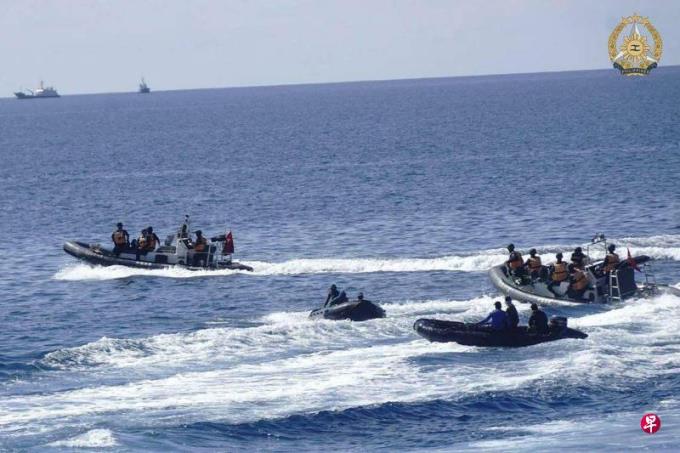
The negotiation table on the negotiating table is undoubtedly the best strategy to prevent the South China Sea from being reduced to Ukraine. In addition to not in line with the strategic interests of the United States to contain China, the negotiations not only in line with the national interests of the Philippines and China, but also the overall interests of Asia's metropolis.Essence
The 21st Shangri -La dialogue kicked off in Singapore on May 31. More than 550 representatives in more than 40 countries discussed on many worlds and regional hot issues in the three -day dialogue.During the period, the situation of the South China Sea, which was constantly warmed, once again became a hot topic of Xianghui, which affected the world's attention.
The Philippines and China fought for a few months of sovereign disputes on the sovereignty of the South China Sea, and a small -scale conflict also occurred. Among them, Renai Reef (the Philippines called Ayunjin Reef) was the main hot spot.Not long ago, the Philippine vessels tried to provide supplies to the warships of Renai Reef on the beach, and the Chinese side responded to the interception of high -pressure water gun bombardment, and this conflict has become more and more intense.
As a relatively weak person, the Philippines, is actively seeking international forces to support its position on the South China Sea issue.In the context of the intensified game between China and the United States, the Americans keen seize the opportunity and increased their efforts to get involved in the security affairs of Asia -Pacific.As soon as the United States and the Philippines are shot, they will meet with their cooperation to counter China's influence on the region.
As an important part of the United States and Philippine cooperation, this year's Meifei shoulder -shoulder exercises are particularly noticeable.The exercise was held from April 22nd to May 10th. The content includes simulated sinking target ships and regaining islands control. The sword refers to Beijing.An article published by the Australian Foreign Policy Institute of Foreign Policy, the Institute of Institute of Foreign Policy, pointed out that the most noteworthy is that this is the first time that the interdisciplinary exercise is held in the 12 nautical miles of the Philippines, which directly challenges China's sovereignty in the South China Sea.
At the same time, the Japanese Economic News reported on May 8 that Germany, France, and other European countries are deploying ships and military planes to the Pacific region with "the scale that they have never seen before."The sea is held to show the power to fight against China and Russia.In addition to the United States, Japan, Australia, etc., the Philippines has also been supported by India and South Korea, and it seems to form alliances with a framework with rules -based international order.At the end of April, India officially delivered the first batch of "Bramos" anti -ship missiles to the Philippines. South Korea expressed concerns about the Chinese Maritime Police's "use of water cannons" in the South China Sea that caused the Philippine vessels to be damaged and injured.
Asian version of Ukraine?
The Philippine President President Matskus spoke at a forum in Washington in April to warn that once the "foreign forces" cause the life loss of any Philippines, it is equivalent to attacking the Philippines.Defense treaty.Sagas also said that the US Defense Minister Austin assured him that with the upgrading of the tension of South China, Washington will perform a common defense treaty signed with Manila.
As the Asian version of NATO has gradually formed, the risk of conflict between East Asia is increasing day by day.Nowadays, the tension of the China Sea is tension, and the tightness is much beyond the Taiwan Strait.To this end, the South China Morning Post published a review article on May 8th that as the tension exacerbated, the outside world was concerned that the South China Sea might be the "Ukraine of Asia" ignited the war.
In this context, if the South China Sea really becomes "Ukraine of Asia" and the stakeholders are dragged into the war, then not only the misfortune of China, but also the disaster of the Philippines and the entire Asian safe.
As far as the Philippines and even the entire Southeast Asia are concerned, due to the upgrading of the South China Sea dispute to an open conflict.Then, like the damage suffered by Ukraine, the conflict between the South China Sea will inevitably have a profound impact, which not only causes severe damage to the Philippines, but also causes the unstable situation of Southeast Asia and other regions.Southeast Asian countries will also be reduced to a pawn of competition in large powers, and they have to stand separately. The unity and core position of Asian'an will be damaged.
As far as China is concerned, the probability will repeat the mistakes of Russia today -not only will not be trapped in the long -lasting consumption, which will cause various limited resources to continue to the war; it may also induce suspicion in neighboring countries., And worsening its geopolitical situation.What's more important is that it is likely to interrupt China's modernization process again.
What should I do?
The negotiation table on the negotiating table is undoubtedly the best strategy to prevent the South China Sea from being reduced to Ukraine. In addition to not in line with the strategic interests of the United States to contain China, negotiations are not only in line with the national interests of the Philippines and China, but also the overall interests of Asia.Of course, Magakus's consideration from its internal political interests cannot show weakness in the short term.How to make the Philippines return to the negotiating table is indeed testing Beijing's political wisdom and great power.
The fact is that China has always been a great country with no shortage of political wisdom.In order to achieve the unity of the motherland, to face history and reality, this country has not proposed the concepts and policies of "one country, two systems", and in orderP>
On January 16, 1980, Deng Xiaoping made a report entitled the current situation and task at the cadre meeting convened by the Central Government.The report proposes that what China should do in the 1980s is three major events: "First, to oppose hegemonism in international affairs and maintain world peace. Second, Taiwan returns to the motherland and realizes the unity of the motherland.Among them, the four modernization construction is the core of the three things. Stepping on economic construction is to step up the four modernization construction. "It is in this context that Deng Xiaoping creatively proposed that through the policy of putting on hold of disputes, the expansion of disputes was avoided.
The basic meaning of"Polishing controversy and joint development" is: First, the dispute over territorial disputes can be put on hold on the dispute without talking about sovereignty's ownership without being completely resolved.The controversy is not to give up sovereignty, but to put the controversy first; second, to develop some controversial territories.Solving the creation of sovereignty.
On October 25, 1978, Deng Xiaoping visited Japan as the Vice Premier of the State Council. During the talks with the Japanese Prime Minister Fukuda, Deng Xiaoping emphasized that the two sides should focus on the overall situation on the issue of the Diaoyu Islands (Japanese island).And at the press conference held later, he pointed out far awareness, "When the normalization of diplomatic relations, the two sides agreed not to involve this issue. When talking about the China -Japan peace friendship treaty, the two parties also agreed to involve.It is more wise, it doesn't matter if you put this kind of problem.
After the dispute between the South China Sea (China is called the Nansha Islands dispute), Deng Xiaoping once again put forward this idea: "The Nansha Islands is an inherent territory in China in history.Starting from the friendly relations between the two parties, we tend to put this problem first, and then propose a solution that both sides can accept. Do not have military conflicts because of this.When Laurel visited China, Deng Xiaoping proposed to him, "The Nansha problem can be put on hold first, and put it first. We will not let this problem hinder the friendly relationship with the Philippines and other countries."In April 1988, President Corassan visited China, and Deng Xiaoping explained the idea again when he met her.He said, "Starting from the friendly relations between the two countries, this problem can be put on hold first and adopt a common development method."Since then, President Corazan and Vice President Laurel responded positively to Deng Xiaoping's claims.
This idea of resolving territorial disputes is undoubtedly of great reference significance for the resolution of the South China Sea dispute between China and the Philippines.The reason is simple. At present, China must take the advancement of Chinese -style modernization as the largest politics.This requires China to have a peaceful and stable surrounding environment.
The author is a Chinese economist and a financial columnist




